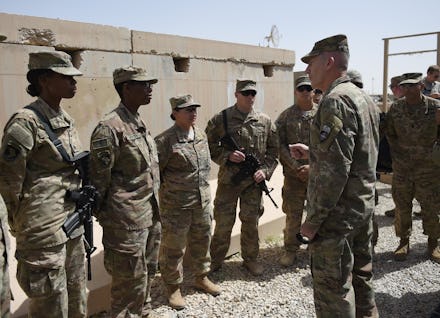Thousands of immigrants who joined the military are struggling to get US citizenship

New screening measures for immigrants who wish to gain U.S. citizenship have delayed thousands of enlisted soldiers, the New York Times reported Saturday, with at least 4,300 Army enlistees alone finding themselves ensnared in lengthy waits for background checks which leave them unable to enter basic training or deploy overseas.
The stricter vetting procedures are not the invention of President Donald Trump, but began in the "waning months" of former President Barack Obama's administration. According to the Times report, the affected personnel must remain on U.S. military bases until the reviews are completed — and about 1,500 Army personnel had been waiting so long that their legal status had expired by November.
Most of the soldiers impacted are seeking citizenship through Military Accessions Vital to the National Interest, a program for enlistees without U.S. citizenship who have special medical or language skills that have lived in the U.S. at least two years. MAVNI enrollees can place in the Army, Navy, Marine Corps and Air Force, and are fast-tracked to receive U.S. citizenship as soon as they complete basic training. According to the Times, some 10,000 people have gained citizenship through MAVNI; a Department of Defense fact sheet from 2015 noted over 109,000 people had attained citizenship through military service generally since the Sept. 11, 2001 terror attacks on the World Trade Center.
But under the enhanced screening procedures, thousands of recruits subject to "at least 10 years [of background checks] on finances, education and professional activities, on top of credit and criminal background checks" as well as extensive interviews, the Times wrote. The paper added since the backlogged recruits are not full-time soldiers but reservists, they do not draw full pay, and the Army says some could even eventually be deported.
Seven recruits have filed lawsuits saying their applications have been unnecessarily delayed.
Anbazhagan Chinnappillai, who told the Times he came to the U.S. from India in 2013 on a student visa which has since been revoked when he joined the military, said his military service has been delayed indefinitely.
"I thought joining the military was going to help me have a better life, like an American dream," Chinnappillai said.